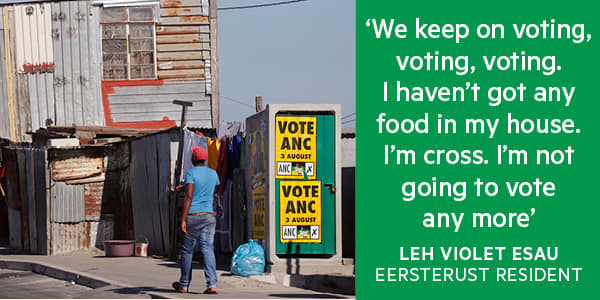We are bumbling from crisis to crisis. Wading in an ever-deepening river of problems. There are more questions than answers. Disappointment turns to despair and frustration to rage.
It would be foolhardy to view the current student protests in isolation from the broader context of our society.
The crisis on the platinum belt that culminated in the Marikana massacre, the daily community protests across the country that led to the death of Andries Tatane and others like him at the hands of police, the energy crisis that strangled the country’s productive capacity, the billions reportedly lost to corruption and maladministration annually, the politicisation of the Hawks and NPA, the undermining of the public protector and the failures of our education system have something in common.
These crises are all rooted in failures of governance: the lack of capacity and, more importantly, the lack of political will in government to act decisively.
Police, on a daily basis, act as mediators between citizens and unresponsive public and private institutions.
Streets, koppies and university campuses are becoming mini “war zones” where running battles take place between protesters who are staking a claim on their constitutional rights and police who are attempting to fulfil their rule of law mandate.
Leadership matters. It does not matter how much the ANC attempts to placate the public with its philosophy of collective responsibility. The buck has to stop with somebody not somebodies. That’s why we have a president.
He is the embodiment of final and supreme accountability. His cabinet, his government, his party’s performance is a reflection on him, on his leadership.
And so it is apt to zoom in on his action on the student protests this week.
President Jacob Zuma convened a stakeholder meeting to address the student protests on Monday. Unfortunately, the main headlines on that day were not that he navigated the meeting of stakeholders towards a solution.
When student leaders, parents, university management and representatives from the faith-based community gathered, he made his speech. And then he left.
This was the epitome of a head of state and government who thinks that solving the impasse between students, universities and government (and indeed other of the country’s difficult problems) is as straightforward as a pilot putting a plane on autopilot after she takes off.
It was pertinent that Zuma stick around, especially because it was his short-term solution of a 0% increase for 2015 that created heightened expectations among students for which an 8% capped increase in 2016 was an anti-climax.
It is this kind of absentee leadership, the constant delegating of thinking and problem solving to ministers, commissions, committees, task teams, advisers and any others that is the bane of President Zuma’s leadership and administration.
It is this undiscerning reliance on collectivism that is paralysing the government and making it prone to unconstitutional acts, open to constant litigation, and suspended on an axis of uncertainty and indecision.
Under this current administration the ANC has betrayed its inability to solve our society’s problems.
It has also failed to at least achieve the sort of social compact between all sectors of society that would see them contributing constructively to addressing the structural and systemic issues that are at the root of the crises, including that in higher education.
As observed by the ANC national executive committee this week, there is indeed a trust deficit that has resulted in a loss of confidence in the ANC.
The tone of protests from Marikana to the fallist movements led by students at universities demonstrates that trust deficit and loss of confidence.
People are not only frustrated at how the ANC-led government has failed to break the impasse on issues that are critical to transformation — land reform, education, inequality, jobs and ownership of the economy.
What should be of great concern to the ANC is that people don’t see the ANC-led government, as it is currently constituted, as the vehicle through which these impasses can be resolved.
The ANC has spent the past seven years of Zuma’s administration feeding the people false promises and hollow ideology and placating them with “a good story to tell”, while indulging in the fruit of impunity.
It has mismanaged municipalities and government departments with impunity.
It has allowed cronyism, toxic patronage and corruption to thrive with impunity. It has left good policies unimplemented and problems unsolved.
It has underplayed serious matters of integrity even at the level of the highest office in the land, with impunity.
But the local government elections that removed the mandate from the ANC in integral municipal centres represents the trend in society of rejecting the ANC’s reign of impunity.
Nevertheless, the culture of impunity has unfortunately been entrenched, creating an environment where characters like Hlaudi Motsoeneng, Berning Ntlemeza’s Hawks, violent criminals and arsonists in the guise of student protesters at universities and community protesters in places like Vuwani, can thrive.
This impunity has left behind it a trail of destruction and is portending a dangerous and uncertain future. But the NEC had nothing new to offer. — Sowetan
http://www.rdm.co.za/politics/2016/10/07/the-anc-fed-us-a-good-story-while-they-indulged-in-the-fruit-of-impunity

